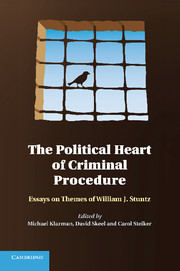Book contents
- Frontmatter
- Contents
- Contributor List
- Introduction: Appreciating Bill Stuntz
- Part I The Political Economy of Substantive Criminal Law
- Part II Police Investigations
- Part III Emotion, Discretion, and the Judicial Role
- 9 Two Conceptions of Two Conceptions of Emotion in Criminal Law: An Essay Inspired by Bill Stuntz
- 10 Patrolling the Fenceline: How the Court Only Sometimes Cares about Preserving Its Role in Criminal Cases
- 11 Three Puzzles in the Work of Bill Stuntz
- 12 The Mercy Seat: Discretion, Justice, and Mercy in the American Criminal Justice System
- 13 Epilogue: Three Underrated Explanations for the Punitive Turn
- Index
13 - Epilogue: Three Underrated Explanations for the Punitive Turn
Published online by Cambridge University Press: 05 March 2012
- Frontmatter
- Contents
- Contributor List
- Introduction: Appreciating Bill Stuntz
- Part I The Political Economy of Substantive Criminal Law
- Part II Police Investigations
- Part III Emotion, Discretion, and the Judicial Role
- 9 Two Conceptions of Two Conceptions of Emotion in Criminal Law: An Essay Inspired by Bill Stuntz
- 10 Patrolling the Fenceline: How the Court Only Sometimes Cares about Preserving Its Role in Criminal Cases
- 11 Three Puzzles in the Work of Bill Stuntz
- 12 The Mercy Seat: Discretion, Justice, and Mercy in the American Criminal Justice System
- 13 Epilogue: Three Underrated Explanations for the Punitive Turn
- Index
Summary
Scholarship about American criminal justice today focuses on two questions: How did Americans come to have a 2-million-plus inmate population, nearly half of it African American? How might that swollen inmate population be reduced without triggering a rise in crime? The second question is related to the first: If we can understand how our circumstances arose, we will be better able to change those circumstances in productive ways. Scholars have identified a host of answers to that first question, but three possible, partial answers have largely been ignored – I have certainly ignored them in my work, and I’m pretty sure the same is true more generally in the field as a whole. All are about the allocation of power over criminal punishment: precisely what has to change if the future of criminal punishment is to look different than its past. The first two partial answers concern institutional dynamics; the third stems from legal doctrine.
The first institutional dynamic concerns federalism, sort of. A rich vein of scholarship explores the lines between federal and state power, but those lines have only modest effects on the justice system, because the overwhelming majority of those inmates reside in local jails and state penitentiaries, not in federal prisons. The more important lines are between state and local power. Though a few perceptive scholars – Rachel Barkow's work on state sentencing commissions comes to mind – have begun to explore those lines, the exploration has not gone nearly far enough. As to local prosecutors, prison time is something close to a free good, paid for by the state. And local prosecutors, not state legislators or governors, have been the key actors in the explosion of America's prison populations. Changing that state of affairs is key to bringing those populations under control.
- Type
- Chapter
- Information
- The Political Heart of Criminal ProcedureEssays on Themes of William J. Stuntz, pp. 228 - 230Publisher: Cambridge University PressPrint publication year: 2011



